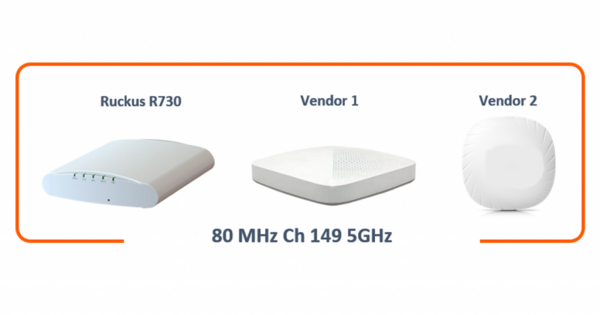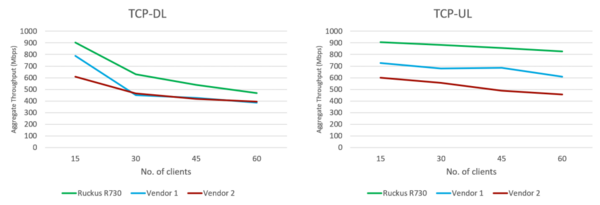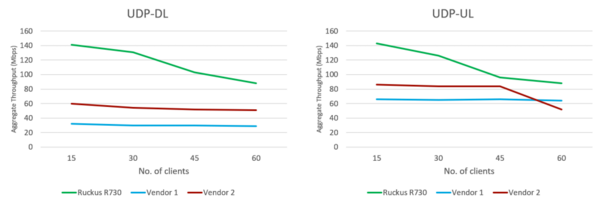The Ruckus Technical Marketing Engineering team recently pitted the company’s flagship R730 Wi-Fi 6 (802.11ax) access point against competing Wi-Fi 6 APs from vendor 1 and vendor 2. All tests were performed in a classroom with 60 MacBook Pro clients (802.11ac) connected to the 5GHz radio of each AP. It should be noted that one of the APs from a competing vendor had its second software defined radio turned off for these tests as well.

The AP Contenders
All APs were powered up using multi-gig ports of the ICX 7650 switch. WPA2-PSK encryption was enabled for the tests with an encrypted SSID. The Ixia Chariot testing software was used with endpoint software installed on each client device. TCP frame size was set at a standard 1460.
The results? The R730 beat the competition by as much as 33% in downlink tests and 25% to 33% for uplink. These tests are with 802.11ac (Wi-Fi 5) devices, so results are expected to be even better when Wi-Fi 6 clients begin shipping in volume this year.

TCP-DL/UP Results
This test is useful when looking at performance with maximum frame size. However not all traffic uses large frame sizes. As a matter of fact, most applications don’t. What happens when we use smaller frame sizes?
The next benchmark test clearly illustrates Ruckus’ advantage with small packets.

This test is notable because smaller packet sizes (65 bytes in this test) create higher CPU utilization on the AP. The reason vendor 1 and vendor 2 AP results flatline (or worse) is that they are hitting 100% CPU usage in the tests. Due to a superior CPU architecture, the R730 yields twice the throughput of the next best competitor. In real-world terms, this means the R730 delivers superior performance and user experience in deployments where smaller packet size is a crucial makeup in application traffic mix such as a large-scale VoIP deployment.

A similar trend is seen with packet sizes of 256 bytes, 512 bytes, and 900 bytes. The Ruckus R730 consistently outperformed the vendor 2 by a considerable margin (200-400% higher throughput).
Summary
Although Wi-Fi 6 clients are just starting to hit the market, IT organizations looking to upgrade will still reap significant benefits with the Ruckus R730—even for their Wi-Fi 5 devices. As a matter of fact, they may see an improvement due to the R730’s superior architecture. These performance improvements will not only help existing applications, but they are also well-positioned to deliver on new technologies such as the greater demands of CPU-intensive WPA3 encryption.















